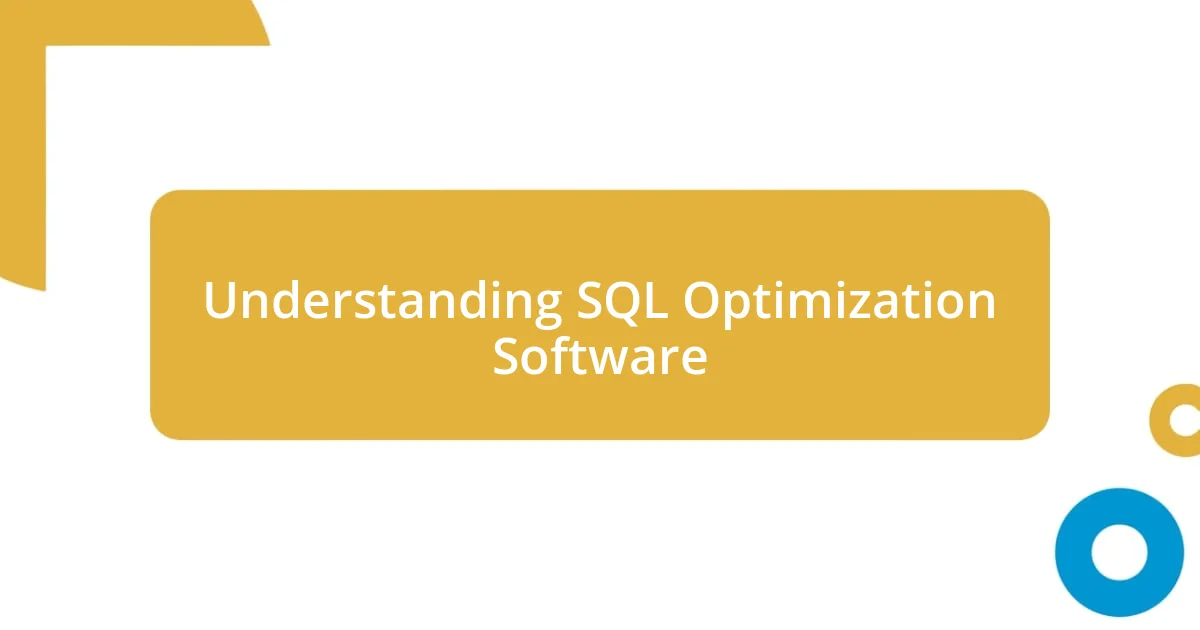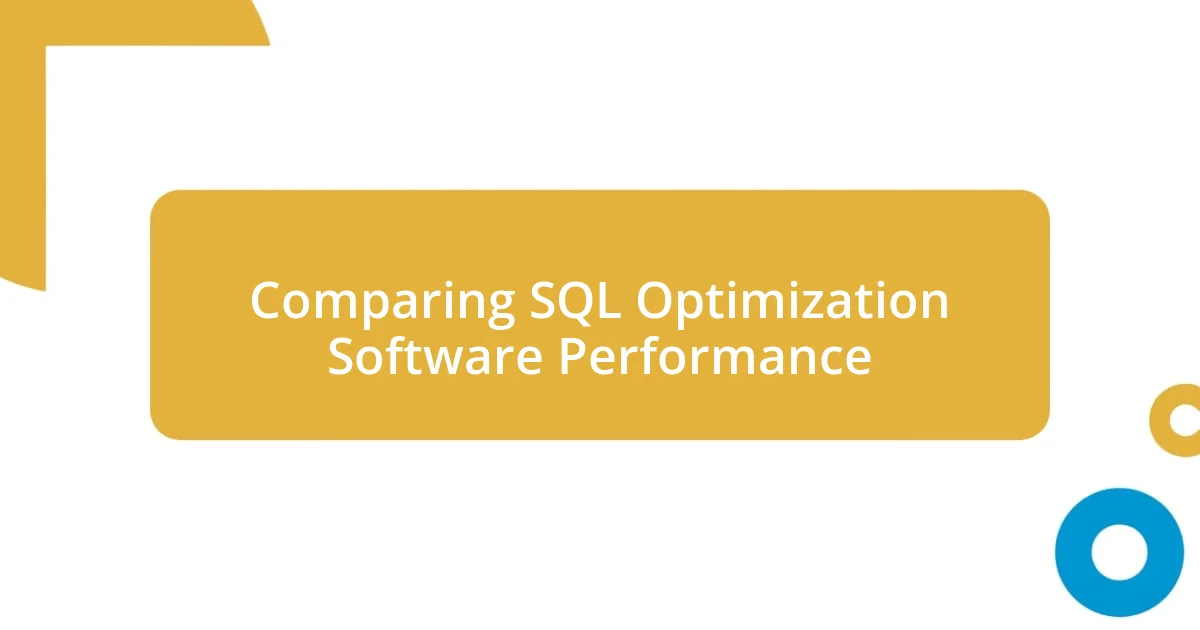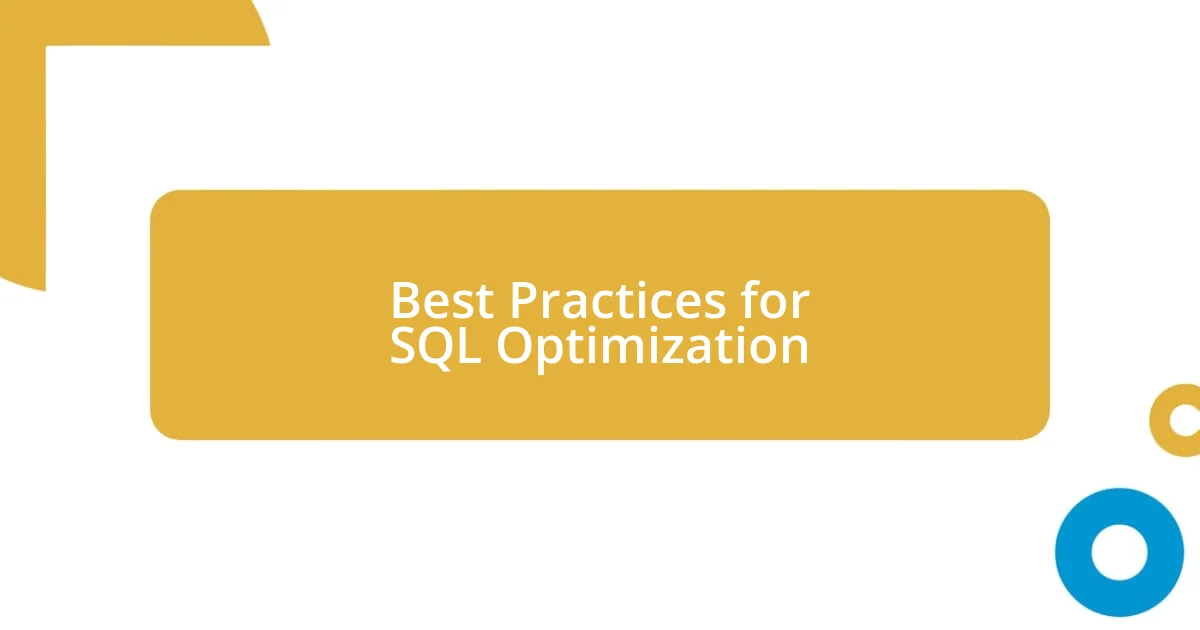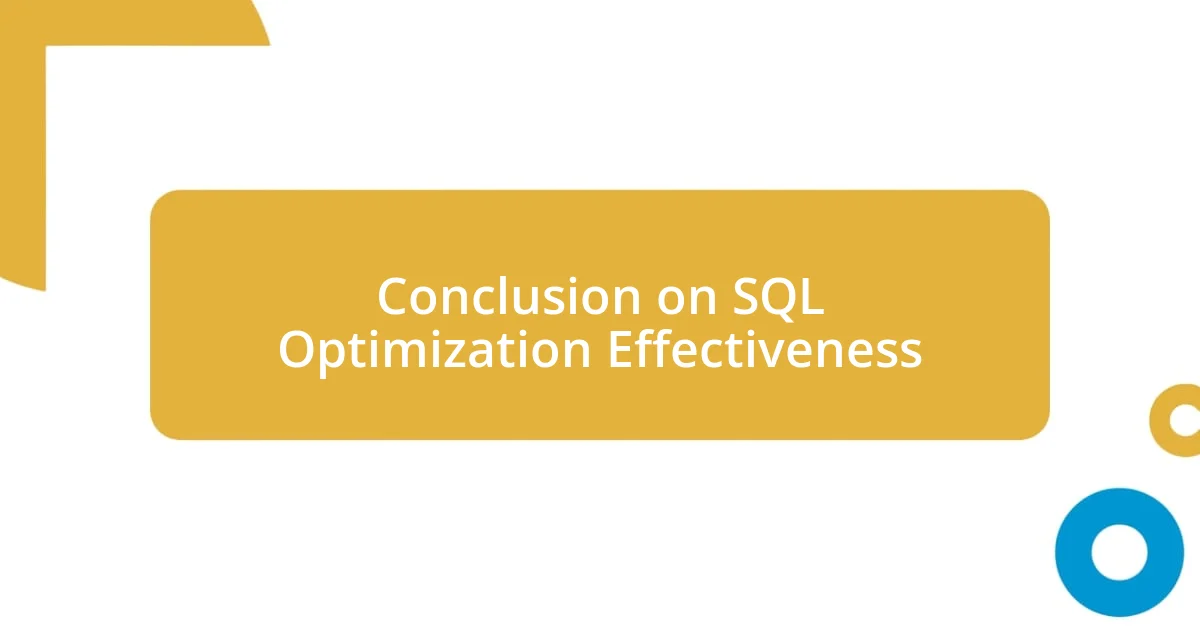Key takeaways:
- SQL optimization software enhances database query performance through accurate analysis, effective indexing recommendations, and simulation capabilities for testing changes.
- Key best practices include evaluating query indexes, regularly analyzing execution plans, and batching queries to reduce server load and improve efficiency.
- The effectiveness of optimization tools is determined by their support and updates, as well as the quality of insights they provide, impacting overall database performance.

Understanding SQL Optimization Software
SQL optimization software is designed to improve the performance of database queries, reducing the time it takes for data retrieval and processing. I remember the first time I integrated SQL optimization tools into my workflow; it felt like discovering a hidden gem. Suddenly, queries that used to lag felt like they were sprinting!
These tools analyze query execution plans and offer insights into better indexing strategies. Have you ever watched a long-running query and wondered if there was a way to speed it up? I’ve been there, and it’s frustrating. With the right optimization software, I’ve not only managed to boost efficiency but also gained deeper insights into how data flows through my systems.
One key feature I appreciate is the ability to simulate changes before applying them, minimizing the risk of issues in production environments. This kind of safety net allows me to experiment with different optimization strategies confidently. It’s almost like having a personal coach guiding me to execute my plays more effectively—no more fumbling through lengthy processes!

Comparing SQL Optimization Software Performance
When comparing the performance of SQL optimization software, I’ve found that not all tools are created equal. My experiences show that performance metrics can vary significantly across different systems. For example, one tool I tested dramatically improved query response time from several seconds to milliseconds, while another barely made a dent despite promising features. It’s crucial to look under the hood, examine user interfaces, and consider how intuitive they are in practice.
Here are some key factors I’ve discovered that can impact SQL optimization software performance:
- Query Analysis Accuracy: Does the tool accurately analyze execution plans? The better the analysis, the more effective the optimization.
- Index Recommendation Quality: A tool that provides meaningful insights for indexing can drastically improve performance; I prioritize those that suggest specific, actionable changes.
- Simulation Capabilities: I value software that allows me to test changes beforehand—this feature has saved me from costly mistakes.
- Integration Ease: How smoothly does the software fit into existing workflows? My go-to tools seamlessly integrate into my processes, enhancing rather than hindering productivity.
- Support and Updates: Is the vendor responsive? I’ve continued to benefit from tools that receive regular updates based on community feedback, making them feel dynamic and reliable.
Understanding these elements helps in choosing the right software that not only meets my needs but also contributes to a smoother database management experience.

Best Practices for SQL Optimization
When it comes to SQL optimization, there are several best practices I’ve adopted over time that truly make a difference. First, always start with querying the right indexes. I once overlooked indexing and faced a significant performance hit; it was a frustrating lesson. Now, I make it a point to evaluate and adjust indexes based on query patterns and usage frequency. This effort can drastically reduce the time it takes to retrieve the data you need.
Another practice I swear by is regularly analyzing query execution plans. I often sit back and take a close look at how my queries are performing. It’s like watching a play unfold, and I can spot the bottlenecks—all those times I thought everything was smooth sailing only to discover a slow query lurking behind the scenes! By identifying these issues, I can rework the queries for optimal performance.
Lastly, utilizing proper batching techniques has been a game changer for me. Instead of running multiple individual queries, I learned to group them together, minimizing the overhead on the database server. I had a project where this approach not only sped things up but also significantly lowered server load. These adjustments, although small, have greatly enhanced my overall efficiency and helped me keep my sanity when dealing with complex databases.
| Best Practice | Description |
|---|---|
| Query Indexing | Evaluate and adjust indexes based on usage patterns for faster data retrieval. |
| Execution Plan Analysis | Regularly review execution plans to identify and fix performance bottlenecks. |
| Batching Queries | Group multiple queries to reduce overhead and improve server efficiency. |

Conclusion on SQL Optimization Effectiveness
As I reflect on my journey with SQL optimization software, it’s clear that the effectiveness of these tools hinges on several critical factors. I once invested time in a solution that promised to streamline my database processes. However, after using it for a few weeks, I realized it lacked accurate query analysis, leaving me frustrated and wondering if I had wasted my efforts. This experience showed me that while some tools look promising on the surface, their real value only becomes apparent through practical use.
Moreover, I’ve learned that the quality of indexing recommendations can make or break performance. There was a time when I blindly followed a tool’s generic suggestions, only to find my database running slower than before. It felt like being let down by a trusted friend. However, after refining my approach to prioritize tools offering detailed insights and tailored recommendations, I noticed substantial improvements in query speed. Isn’t it incredible how the right advice can illuminate the path to efficiency?
Lastly, I can’t emphasize enough how crucial support and updates are in this realm. I recall using software that seemed great at first but quickly fell behind without any new features or updates. The stagnation not only hindered performance but also left me feeling abandoned. After switching to a tool with a proactive support team, I found myself more confident in optimizing my database. It’s amazing how feeling supported can transform an overwhelming task into a more manageable and effective process!













